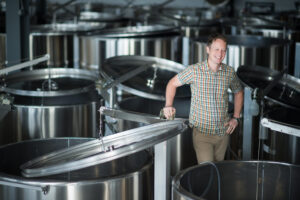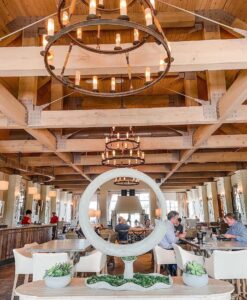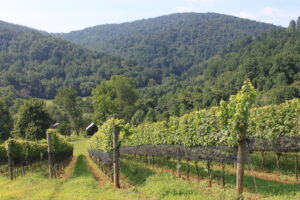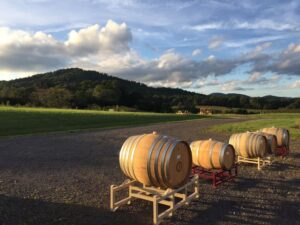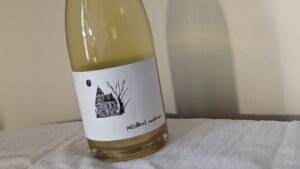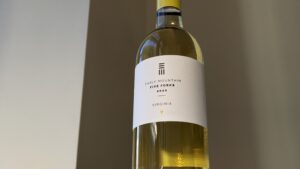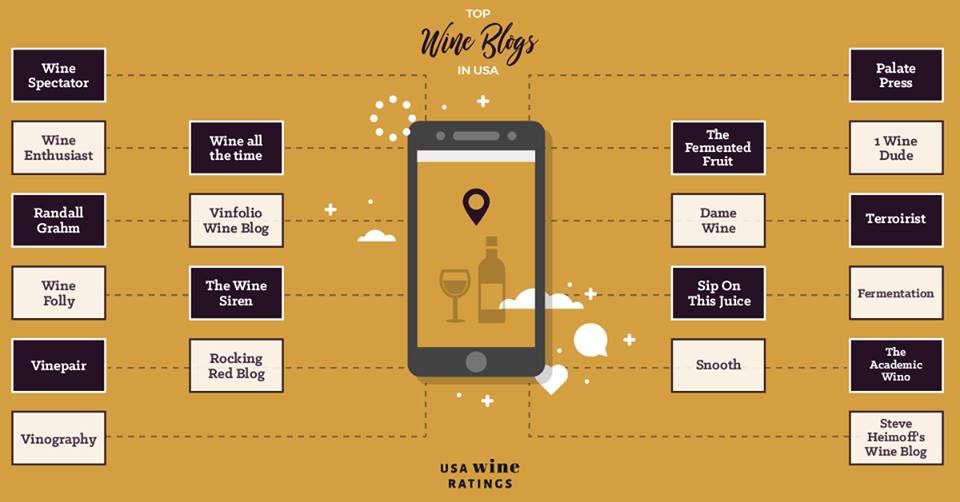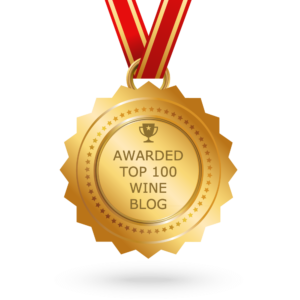It takes a certain type of person to do really well in the Virginia wine industry – one who wants to be part of building the foundation of a wine region, where things are changing year in and year out; for some it is an overwhelmingly frustrating place to work yet for others it is extremely exciting. “Virginia is very selecting of its people in that way,” noted Ben Jordan, winemaker of Early Mountain Vineyards, a wine producer in the town of Madison, Virginia. Despite Ben being born and raised in Virginia, it is a place that still surprises him all the time and one doesn’t have to necessarily be born there to have such a spirit to survive it as the wine industry is finding momentum and bringing in people from all over the world as interns – as long as they are looking for a place with lots of challenges then Virginia is for them. Ben says that it certainly says something about someone who stays after spending a vintage in Virginia as it is not a place for the faint of heart – its continental climate can bring brutal winters as well as ill-timed rains right before harvest and for many in the wine industry, those aspects of it would seem like impossible hurdles to overcome. But for those who have made the firm commitment to be part of the Virginia wine industry, they realize that they can’t just follow the practices of wine producers in California or even France as what they have is not exactly like any other place.
Virginia is finding what makes them special in a very unique way – by trying grape varieties that are not that commonly known or pushing the envelope of those varieties that are known as well as understanding that Virginia producers are not placed into a box because of their climate; there are ways to match the ideal place to the ideal grape through trying what makes sense for their particular set of circumstances. Sometimes taking a shot in the dark when it comes to using unconventional techniques for classic grape varieties can pan out really well too.
Early Mountain Vineyards
Jean and Steve Case bought the Early Mountain Vineyards property in 2010 and although it was a dream, the dream wasn’t only personal as they envisioned making world class wines, backed with a good marketing and distribution infrastructure, that would bring national attention to Virginia as a wine region; becoming a robust industry that would help Virginia’s economy as a whole, especially considering that they themselves saw the significant increase in quality of Virginia wines over the years. Jean and Steve have been both extremely successful with their careers as Steve was one of the co-founders of AOL and Jean was an executive in the private sector that included marketing and branding for AOL. Together they started the Case Foundation which is a philanthropic organization that invests in people and ideas that change the world.
Since Early Mountain Vineyards is more widely marketed and distributed into small restaurants and retail stores that value unique, high quality wines, they have also been a part of helping other Virginia wineries who do not have the resources to do so. Early Mountain Vineyards has also garnered some widely publicized acclaim by winning USA Today’s Best American Tasting Room in 2016 and was one of the finalists for Wine Enthusiast’s American Winery of the Year – 2018. Yet their mission is to not just become a well-known name themselves, it is to bring more visibility to the quality wines of Virginia, and so they offer tastings in their popular tasting room under the title of the ‘Best of Virginia’ that showcases a range of established wineries in Virginia as well as young and cutting edge producers.
But the Cases’ mission would have no chance if they didn’t have the right winemaker and that is where Ben Jordan comes in. He is someone who found his way into wine when he left Virginia by working in wine sales in San Francisco; there he was able to taste wines from all over the world to develop his palate. But as time went on, he wanted to get a better understanding of the process of making wine, working his way through the process which started in the vineyards up to the final product and he found himself working at a winery in the Russian River Valley as well as having a few other shorter stints in other areas of Sonoma County. He came back to Virginia to make use of his knowledge by working at one of the next generation pioneers of Virginia, Michael Shaps Wineworks – a custom crush facility that works with fruit from all over Virginia. As a winemaker working with various vineyards, Ben really got a first hand education into the wide range of quality and characteristics of Virginia vineyards and that is when he discovered that the soil could be a stronger factor than climate in certain sites; it is also when he discovered his love for the Petit Manseng grape variety.
Unusual Grape Varieties and Unusual Practices
Petit Manseng is a white grape variety that finds its original home in southwestern France in the area of Jurançon. It is many times either seen as a sweet or off-dry wine and when it is dry it is usually blended. It is barely seen in the U.S. market and so for most people it is a grape that they have never heard of and that within itself brings a big challenge. Yet according to Ben, it is a vinifera grape (vinifera is the species of grape varieties most known for high quality wine) that deals with mildew better than most as well as the “architecture of the grape cluster is such that it can really hang through rain and on top of that it has the ability to retain concentration of sugar.” Petit Manseng has thick skins and a tendency to develop rich fruit and higher alcohol levels while retaining acidity and if anything, a wine producer has to make sure the alcohol doesn’t get out of hand if allowing the grape to hang on the vines longer as well as the tendency to become too rich and overpowering. Hence, Ben will pick the Petit Manseng grapes destined for a dry varietal bottling in three different passes as to make sure to get grapes at different ripeness levels.
But for an area that has an issue with ripening certain grape varieties as well as an ill-timed rain before harvest, the rain can help to “tap down the power” of Petit Manseng and make it a more balanced wine.
When it came to Early Mountain trying their hand at making a Bordeaux blend from certain vineyards around the estate, they realized that those vines were better for lighter reds or rosé wines. And this goes back to their philosophy that nothing should be forced – if a high quality Bordeaux blend cannot be made, no matter how badly they want to make one, it is not going to be part of their portfolio of wines. Yet they were able to take over another vineyard called Quaker Run in 2014 that really showed the power of site in Virginia. Quaker Run Vineyard is only 20 minutes from Early Mountain Vineyards estate but it is on the side of the Blue Ridge Mountains which is rocky and steep and it is able to grow Merlot and Cabernet Franc in some sections that are concentrated with plenty of acidity and structure for ageability, balanced by beautiful aromatics and an overall elegance. They were also able to get a premium Chardonnay wine from Quaker Run as well that comes from 20 year-old vines. That may not be considered old by European standards, but Ben says that they act like mature vines showing a lovely balance of finesse and richness.
Another discovery for Ben has been how much Cabernet Franc shows an affinity to displaying terroir like Pinot Noir – a grape that he is familiar with from his Sonoma County days. And that has led Early Mountain to bottle five different kinds of Cabernet Franc, two regional and three vineyard designated sites. And even though Ben is happy that he got a chance to work in a wine region like Sonoma that has most things figured out, it is a different kind of thrill to work in a region where every step has to be discovered and that there is no other well-known wine region in the world that they can successfully copy as Virginia has a unique set of circumstances.
Site Outperforming the Weather
But there is no doubt that it takes a lot of courage and it takes a strong will that can get one past the many failures that will be faced in working in an area that has no handbook for success and actually working like another known wine region will only lead one down a path of mediocrity. There is nothing wrong with facing the fact that Virginia has a tough climate when it comes to comparing it to California or even France but that doesn’t mean there is not something special about Virginia as a wine region. Ben is starting to see, even to his own amazement, that sites will outperform the weather and that there are certain underappreciated grape varieties that can shine in Virginia, and as Ben likes to remind people, it is still a very young wine industry and is just the beginning of them discovering where they excel.
***This article originally appeared on Forbes: https://www.forbes.com/sites/cathrinetodd/2021/12/28/the-us-wine-region-attracting-wine-producers-seeking-challenges-and-a-state-of-fluctuation/?sh=466291ef24b7
All of the Early Mountain Vineyards wines use ambient yeasts for a spontaneous fermentation with the exception of their rosé wine.
Early Mountain Vineyards is part of the Monticello AVA (American Viticultural Area), which was the first established AVA in Virginia and the area encompasses the eastern slopes of the Blue Ridge Mountains. It is an historic area due to the fact that it was the home of Thomas Jefferson and that there are records dating back to the 1700s noting that Jefferson hired an Italian winemaker to make wine from native grapes in Monticello. Early Mountain Vineyards is located in the town of Madison and almost all of the below grapes are sourced from the Monticello AVA with the exception of the 2019 Early Mountain Vineyards, Shenandoah Springs Vineyard Cabernet Franc wine which is from Shenandoah Valley AVA in Virginia.
2020 Early Mountain Vineyards, Pétillant Natural, Virginia: 71% Malvasia Bianca and 29% Muscat Blanc. This sparkling white wine is a Pét-Nat, a natural wine where the bubbles are created by the fact that it is bottled during fermentation – an ancient technique for sparkling wines – this Pét-Nat is disgorged so there is some sediment but not as much as you would see in many other Pét-Nat wines. Floral notes with lemon confit and hints of blanched almonds with a mouthwatering acidity. Early Mountain Vineyards makes Pét-Nat and Champagne method sparkling wines as their associate winemaker and viticulturist Maya Hood White has a real passion for sparkling wines.
2020 Early Mountain Vineyards ‘Five Forks’, Virginia: 61% Petit Manseng, 32% Sauvignon Blanc, 4% Chardonnay and 3% Pinot Gris. At the heart of this blend is the Petit Manseng and sometimes Chardonnay and Pinot Gris are added depending on the vintage. The brightness and slight herbaceous quality of the Sauvignon Blanc balances the richness of the Petit Manseng. A mix of stone fruit, nectarines and minerality on the nose with green mango on the palate with a background of dried herbs that is overall a bright, very drinkable wine.
2019 Early Mountain Vineyards, Petit Manseng, Virginia: 100% Petit Manseng. They do three different passes when it comes to harvesting the Petit Manseng for this wine as Ben Jordan notes that the first pick gives more orchard fruits like apple, the second gives slightly riper, sweeter fruit qualities associated with peach and apricot and the final pick has more tropical fruit notes. Golden color because of the thick skins of the grapes with a delicious nose of honeysuckle, ripe pineapple and golden apple with a rich nuttiness from the long fermentation of this wine.
2019 Early Mountain Vineyards, Quaker Run Vineyard, Chardonnay, Virginia: 100% Chardonnay. Goes through full malolactic fermentation as it has high acidity but they don’t allow all of their Chardonnay wines to go through full malolactic fermentation as it depends on the site. The grapes from the Quaker Run Vineyard have the ability to ripen a week or two after the other grapes while retaining acidity and so the wines are concentrated yet still vibrant and fresh. Pretty nose with lime blossom and wet stones with richer juicy peach flavors on the palate with good weight and mineral-driven finish.
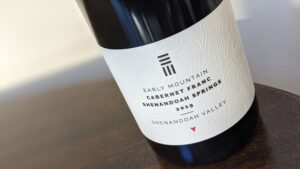
Photo Credit: Cathrine Todd
2019 Early Mountain Vineyards, Shenandoah Springs Vineyard Cabernet Franc, Virginia: 100% Cabernet Franc. The Shenandoah Springs Vineyards is in the Shenandoah Valley which is a big AVA so it is around 150 miles from the south to the north so hard to generalize but two things do stand out about this area: less rain and higher elevations. Ben believes that Cabernet Franc has an affinity for showing terroir just like Pinot Noir and this was one of the sites that convinced him of it – hence they make five Cabernet Franc wines, two regional and three vineyard designated sites. Enchanting note of violets with ripe blueberry jam (2019 was a hotter and drier vintage and so this is an expression of the vintage) with big, round tannins and hints of broken earth on the finish.
2019 Early Mountain Vineyards ‘Eluvium’ Virginia: 80% Merlot, 19% Petit Verdot and 1% Cabernet Franc. Ben says he employs whole cluster fermentation in this wine that averages around 10%-25% mainly on the Merlot grapes as it comes from the Quaker Run site and that Merlot does really well with whole cluster as it gives it more aromatics with a tannic backbone without any greenness as the stems of the grapes are fully ripe. They also source from other vineyards, one called Capstone Mountain and another called Russ Mountain; Russ is riper and it has more base notes and Capestone is higher elevation so it has more linear, aromatic, high-tone notes and when they are blended together they will get the same result from Quaker Run which produces wines that are ripe and deep as well as linear and aromatic. Multilayered fruit with blackcurrant preserves (again 2019 was a hotter vintage), blueberry pie and fresh black cherries that had finely etched tannins with gravelly earth and a stony minerality undertone with a long, aromatic finish of floral and spicy notes.

